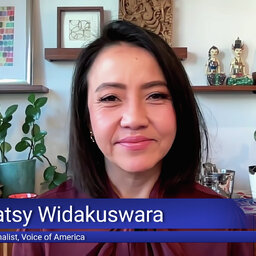Blood Libel in an American Town: Antisemitism in the United States with Edward Berenson
Season 6
Story in the Public Square is a weekly, 30-minute series that brings audiences to the intersection of storytelling and public affairs. Hosted by Jim L…On September 22, 1928, a four-year-old girl named Barbara Griffiths disappeared in the woods near the small town of Massena, New York. At some point in the panicked search that followed, someone speculated that the child may have been murdered by a Jewish resident of the community in a ritual sacrifice. This was blood libel, a well-documented antisemitic slander common in Europe but new to the United States. Edward Berenson details the case and places it in historical and contemporary context.
Edward Berenson is professor of history and chair of the history department at New York University (NYU). Before he began teaching at NYU in 1998, he taught for many years at UCLA. Berenson is the author or editor of eight books on 19th and 20th-century French, British, and U.S. history, two of which have been translated into French. In 1999, he received the American Historical Association’s Eugene Asher Distinguished Teaching Award, and in 2006 he was decorated by former French president Jacques Chirac as “Chevalier dans l’Ordre de Merit.” He has published op-eds in the New York Times and in leading French papers, and comments on American politics and public life for the French media. His most recent book, “The Accusation: Blood Libel in an American Town,” covers the investigation of America’s only alleged case of blood libel, and what it reveals about antisemitism in the United States and Europe.
In 2 playlist(s)
Story in the Public Square
Story in the Public Square is a weekly, 30-minute series that brings audiences to the intersection o…Social links
Follow podcast
Recent clips

The future of the Voice of America with Patsy Widakuswara
27:57

Michael McFaul on the enduring strength of American democracy
29:01

A closer look at immigration policy today with Caitlin Dickerson
28:30
 Story in the Public Square
Story in the Public Square
